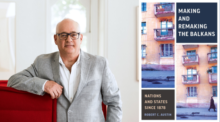DAVIEL LAZURE VIEIRA
When Robert Austin travelled to Albania in the 1990s, little was known about the country –perhaps this was the very reason why, as a student, he took an interest in the former socialist republic in the first place. “I went to Albania when nobody else did, and I felt that I owed it to them to try to tell their story,” he explains. And ever since then, he’s been doing just that, whether through his work as a Tirana-based correspondent for Radio Free Europe/Radio Liberty after the fall of communism in Eastern Europe, or by teaching in the Munk School’s European Studies program at the Centre for European, Russian, and Eurasian Studies.
Austin’s decades-long interest in the Balkans is now captured in his new book, Making and Remaking the Balkans: Nations and States since 1878. “I have spent my whole career talking to people and this book is the product of thousands of conversations in the Balkans,” he says. “I have written lots of academic articles and books, but I wanted to write something that was totally accessible. I wanted my mother to read it and get it. Plus, I have been teaching Balkan history for years, and I wanted a book that I could use in class – there wasn’t one, so I wrote it.” Making and Remaking the Balkans examines the region’s troubled history through field observations, secondary research and testimonies from those who experienced first-hand a century of momentous change, from the violent fragmentation of Yugoslavia in the early 1990s to the uneasy transition to democracy and eventual membership in the European Union. Austin’s passion for reportage runs through the book, coupled with the historian’s keen attention to detail – highlighting key moments in the past that help us better understand the present. He’s written the book he wished he’d found on the library shelves when he was a student.
Making and Remaking the Balkans is part of the Munk Series on Global Affairs, established with a donation from Ken Alexander and Sharyn Langdon and published by the University of Toronto Press. The Series is a curated selection of titles that focus on big ideas informed by the research conducted at the Munk School of Global Affairs & Public Policy, including innovation, security, justice and the economy, examined through a global and interdisciplinary lens. The goal is to provide readers with strong narratives and unique perspectives on current affairs, while at the same time meeting the highest standard of scholarship. The books are also applicable for use in curriculums at undergraduate and graduate levels.
In Making a Global City: How One Toronto School Embraced Diversity, Robert Vipond invites us to analyze Toronto’s multicultural history through the prism of the Clinton Street Public School, showing how successive waves of immigration shaped Canadian society and contributed to the creation of a truly globalized community. More recently, Robert Calderisi examines the curious exception that is La Belle Province in Quebec in a Global Light: Reaching for the Common Ground. Calderisi’s book offers an in-depth survey of Quebec’s current social and economic landscape, tracing its evolution over the last thirty years and highlighting its strengths and contradictions – efforts to strike a delicate balance between economic prosperity and social protection, or to to define national values without sacrificing a tradition of openness.
The Munk Series on Global Affairs reflects a shared commitment: to bring a multiplicity of voices together and invite them to tell us something about the world we live in. For Robert Austin, this means hoping that the book stirs up debate and gets translated, so that the real characters who made the history of the Balkans come to life can join the conversation from afar.
